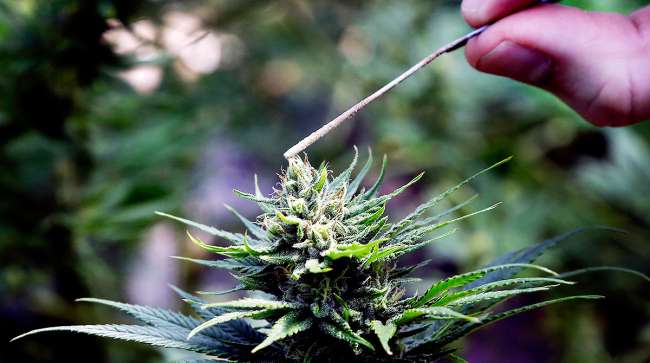Senior Reporter
Legal Status for Transport of Hemp Remains Confusing

The 9th U.S. Circuit Court of Appeals has agreed to hear a legal challenge to the arrest of an Oregon truck driver and seizure of a 6,700-pound load of hemp being transported through Idaho.
The legal case, believed to be the first of its kind since new legislation made industrial hemp legal, pits the federal law allowing production and transport of hemp against an Idaho statute that defines hemp as an illegal substance.
RELATED: Fired Truck Driver Sues Cannabidiol Company After Using Product
The legal fight began in late January when Idaho State Police detected a strong smell coming from a box van trailer during a routine roadside inspection near Boise. Believing the load to be marijuana, police arrested the driver, Denis Palamarchuk, 36, of Portland, on felony marijuana trafficking charges. Authorities also confiscated the load of hemp owned by Big Sky Scientific of Aurora, Colo., the load’s destination.
Although several subsequent lab tests of the substance showed it to be legal industrial hemp as defined in the 2018 Federal Farm Bill signed into law by President Donald Trump in December, the state of Idaho deems hemp and marijuana illegal substances.
Big Sky paid for the driver to be bailed out of jail on a $100,000 bond, and last month the company filed a federal lawsuit seeking to force prosecutors to return its hemp. However, Ada County prosecutors declined to dismiss the case against the driver or release the hemp, and a federal judge agreed.
“In practical terms, the 2018 Farm Bill distinguished industrial hemp from marijuana, added industrial hemp to the list of agricultural commodities and removed industrial hemp from federal controlled-substance schedules,” said Ronald E. Bush, chief U.S. magistrate judge of the District of Idaho. “Though the 2018 Farm Bill removes industrial hemp as a controlled substance under federal law, states and Indian tribes still may declare it to be a controlled substance under state or tribal law. Idaho does not distinguish industrial hemp from marijuana; both are controlled substances under Idaho law.”
But on Feb. 20, the 9th Circuit agreed to hear oral arguments in the case, which could come as early as late April.
“Big Sky was simply shipping a lawful good through interstate commerce and was shocked when Idaho seized its shipment,” Big Sky’s Boise attorney, Elijah Watkins, told Transport Topics. “There have been four different tests in three different states, and every one of those tests has confirmed that the hemp was less than 0.3% THC.”
The concentration of THC, or tetrahydrocannabinol, is the compound responsible for the psychoactive effects of hemp and marijuana.
IDAHO: Roundtable counsel, Frost Brown Todd’s Dick Plymale, Jonathan Miller and Nolan Jackson, fileda “friend of the court” brief yesterday to set the record straight in Idaho. For more details, read more here!https://t.co/7KqYSpvHuP — US Hemp Roundtable (@HempRoundtable) February 8, 2019
In an amicus curiae brief filed in the case, the U.S. Hemp Roundtable Inc. said that if the court were to determine that the 2018 Farm Bill does not protect hemp grown or cultivated, it would “eschew clear congressional intent and cause unnecessary market uncertainty and trepidation in an industry on the cusp of economic boon.”
Hemp is used for a number of products including cannabidiol, or CBD, a substance believed to effectively treat such maladies as anxiety, cognition, movement disorders and pain.
It also is used in such common products as paper, clothing and jewelry.
In a recent statement, the roundtable said the Drug Enforcement Administration no longer has any claim to interfere with the interstate commerce of hemp products as long as the THC level is at or below 0.3%. “This should give comfort to federally regulated institutions — pharmacies, banks, merchant services, credit card companies, e-commerce sites and advertising platforms — to conduct commerce with the hemp and hemp CBD industry.”
But in a motion to dismiss Big Sky’s lawsuit, prosecutors argued that if Big Sky prevails in its lawsuit it would “significantly hamper law enforcement’s ability to enforce Idaho state law” and protect its citizens.
Due to the confusing state of the legality of hemp, American Trucking Associations has been cautioning truckers to think twice about transporting hemp.
“Forty-one states allow the cultivation of hemp for commercial, research or pilot programs,” said an ATA dispatch to members Feb. 18. “However, legal questions have arisen to whether hemp currently in production meets the criteria of the Farm Bill’s interstate transportation pre-emption provision. ATA recommends that motor carriers continue to exercise caution in accepting shipments of hemp.”
In a related development, on March 1 the Idaho legislature’s Joint Finance-Appropriations Committee approved about $240,000 for three hemp testing devices to be used for both the state’s department of agriculture and the Idaho State Police to “stay ahead of interstate commerce and legal procedural issues,” according to one state official. Both the state Senate and House must still approve the expenditure.
“I’d like to point out that hemp is not legal in Idaho and this is not an attempt to legalize hemp in Idaho,” said Republican State Sen. Abby Lee.
“Idaho has received the most press, but I know Wyoming has seized multiple loads and Kentucky also has seized a load,” Bill Reese, a retired Idaho State Police major and head of the state’s commercial vehicle safety unit, told TT. “One of the problems is that the states have no way at roadside to determine whether it’s hemp or marijuana. It smells the same, looks the same. There’s no field portable equipment to test it for THC at this point.”
In Idaho and a number of other states, the laws in effect say if hemp has any THC level, even below the federal limit, it’s considered marijuana, said Reese is director of the Commercial Vehicle Safety Alliance hazardous materials enforcement unit.
Although Congress passed the law, there has been no regulatory framework established, Reese said.
He added, “It’s kind of a convoluted mess right now.”



